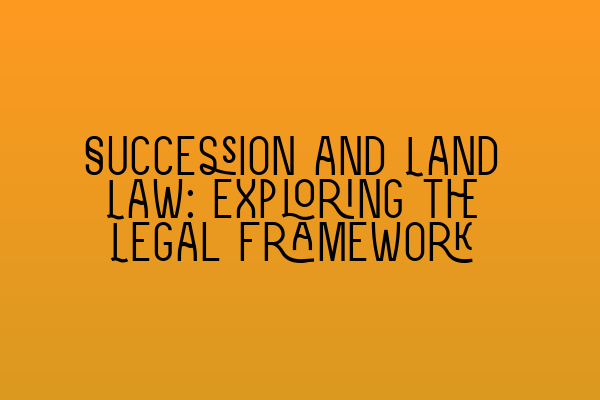Succession and Land Law: Exploring the Legal Framework
Welcome to SQE Property Law & Land Law, where we specialize in providing expert legal advice and services in the field of property law. In this blog post, we will delve into the complex world of succession and land law, exploring the legal framework that governs these areas. Whether you are a solicitor, law student, or simply interested in understanding the intricacies of property law, this article aims to provide a comprehensive overview.
What is Succession?
Succession, in the context of land law, refers to the transfer of property rights from one person to another upon the death of the property owner. It determines who inherits the property and what rights they have over it. The legal framework surrounding succession is essential in ensuring the smooth transfer of property ownership and protecting the interests of the parties involved.
When it comes to succession, there are various legal principles and statutes that come into play. These include:
- The Law of Property Act 1925
- The Administration of Estates Act 1925
- The Trusts of Land and Appointment of Trustees Act 1996
Each of these statutes outlines the rights and responsibilities of the parties involved in a succession case, including the deceased’s personal representatives, beneficiaries, and any trustees appointed.
Types of Succession
Succession can occur in two main ways: through a will or through intestacy. Let’s explore each of these types in more detail:
1. Succession through a Will
A will is a legal document that sets out the deceased’s wishes regarding the distribution of their property after their death. It allows them to name specific beneficiaries and specify how their assets should be divided. The validity and interpretation of a will are governed by the Wills Act 1837 and subsequent case law.
Succession through a will is a more straightforward process, as it follows the deceased’s wishes and instructions. However, disputes can still arise if the will is ambiguous or if there are concerns about the deceased’s mental capacity at the time of making the will.
2. Succession through Intestacy
Intestacy refers to the situation where a person dies without leaving a valid will. In such cases, the distribution of the deceased’s estate is determined by the rules of intestacy set out in the Administration of Estates Act 1925. These rules dictate how the estate should be divided among the deceased’s surviving relatives, with the closest relatives taking priority.
Intestacy cases can be more complex, as they involve determining the rightful heirs based on their relationship to the deceased. Disputes can arise if there are competing claims or if the deceased’s family structure is not straightforward.
Land Law and Succession
Land law plays a crucial role in the context of succession, as it governs the transfer of property rights. The legal principles and concepts within land law, such as estates and interests, co-ownership, and trust law, underpin the framework within which succession operates.
In addition to the overarching statutes mentioned earlier, there are specific rules and regulations related to land law that apply to succession cases. These include the following:
- The Land Registration Act 2002
- The Trusts of Land and Appointment of Trustees Act 1996
- The Law of Property Act 1925
These statutes outline the rights and obligations of the parties involved in a succession case, including the transfer of legal and equitable interests, the creation of trusts, and the requirements for registering land ownership.
Conclusion
Succession and land law are complex areas that require a thorough understanding of the legal framework and the relevant statutes. Whether you are a solicitor working in property law, a law student preparing for the SQE exams, or simply interested in the subject matter, it is crucial to grasp the intricacies of succession and its relationship with land law.
At SQE Property Law & Land Law, we are dedicated to providing expert legal advice and support in all matters relating to property law. If you require assistance with a succession case, or if you have any questions regarding land law, please do not hesitate to contact us.
Related Articles: SQE 1 Practice Exam Questions, SQE 1 Practice Mocks FLK1 FLK2, SQE 2 Preparation Courses, SQE 1 Preparation Courses, SRA SQE Exam Dates.
